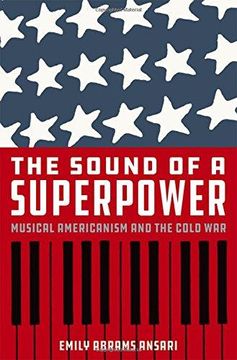Compartir
The Sound of a Superpower: Musical Americanism and the Cold war (en Inglés)
Emily Abrams Ansari (Autor)
·
Oxford University Press
· Tapa Dura
The Sound of a Superpower: Musical Americanism and the Cold war (en Inglés) - Emily Abrams Ansari
S/ 311,64
S/ 623,27
Ahorras: S/ 311,64
Elige la lista en la que quieres agregar tu producto o crea una nueva lista
✓ Producto agregado correctamente a la lista de deseos.
Ir a Mis Listas
Origen: Estados Unidos
(Costos de importación incluídos en el precio)
Se enviará desde nuestra bodega entre el
Miércoles 12 de Junio y el
Miércoles 26 de Junio.
Lo recibirás en cualquier lugar de Perú entre 2 y 5 días hábiles luego del envío.
Reseña del libro "The Sound of a Superpower: Musical Americanism and the Cold war (en Inglés)"
Classical composers seeking to create an American sound enjoyed unprecedented success during the 1930s and 1940s. Aaron Copland, Roy Harris, Howard Hanson and others brought national and international attention to American composers for the first time in history. In the years after World War II, however, something changed. The prestige of musical Americanism waned rapidly as anti-Communists made accusations against leading Americanist composers. Meanwhile a method of harmonic organization that some considered more Cold War-appropriate--serialism--began to rise in status. For many composers and historians, the Cold War had effectively "killed off" musical Americanism.In The Sound of a Superpower: Musical Americanism and the Cold War, Emily Abrams Ansari offers a fuller, more nuanced picture of the effect of the Cold War on Americanist composers. The ideological conflict brought both challenges and opportunities. Some Americanist composers struggled greatly in this new artistic and political environment. Those with leftist politics sensed a growing gap between the United States that their music imagined and the aggressive global superpower that their nation seemed to be becoming. But these same composers would find unique opportunities to ensure the survival of musical Americanism thanks to the federal government, which wanted to use American music as a Cold War propaganda tool. By serving as advisors to cultural diplomacy programs and touring as artistic ambassadors, the Americanists could bring their now government-backed music to new global audiences. Some with more right-wing politics, meanwhile, would actually flourish in the new ideological environment, by aligning their music with Cold War conceptions of American identity. The Americanists' efforts to safeguard the reputation of their style would have significant consequences. Ultimately, Ansari shows, they effected a rebranding of musical Americanism, with consequences that remain with us today.
- 0% (0)
- 0% (0)
- 0% (0)
- 0% (0)
- 0% (0)
Todos los libros de nuestro catálogo son Originales.
El libro está escrito en Inglés.
La encuadernación de esta edición es Tapa Dura.
✓ Producto agregado correctamente al carro, Ir a Pagar.

